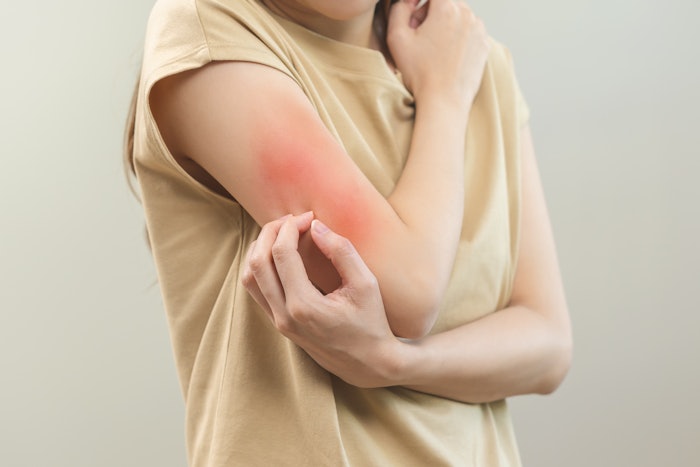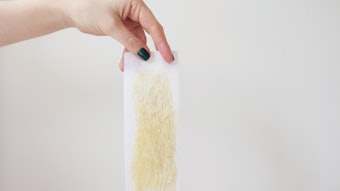
Pruritis is a medical word that means itchy skin. The itchiness may be confined to a small area or be widespread over the body. It may or may not be accompanied by a rash or other signs of irritation, such as blisters or swelling of the skin.
Causes of Pruritis
Pruritis is considered chronic if it lasts for longer than six weeks. If the client develops itchy skin, the first thing to do is try and find out what is causing the problem. Pruritis may be the result of contact with an irritant, dry skin, an underlying health condition (including pregnancy), stress, or a reaction to a medication. Treatment and prognosis depend upon the cause.
Medication or medical condition. If the itchy skin is over the entire, or most of, the body, it may be due to an underlying medical condition or to medication. Diseases that commonly cause itchiness include thyroid issues, liver malfunction, anemia, kidney failure, nerve damage and certain psychiatric diseases. Any medication can cause an allergic reaction that results in pruritis. Do not stop medications without talking to your doctor, but do let your doctor know immediately if you have diffuse itching and are taking any medicines.
Environment. Dry skin can feel itchy. People who live in dry climates are obviously more prone to itching. If the problem is seasonal, it may be related to something in the environment (i.e. pollen).
Skin conditions. Eczema and psoriasis are two chronic medical conditions that result in dry, irritated skin that are usually accompanied by a rash and/or inflamed vesicles.
Skin sensitivity. Sensitivity to soaps, detergents, certain clothing (i.e. wool), pets or environmental allergens can also cause widespread itching. It does take a certain amount of exposure to a substance to build up an allergy to it, so it might not necessarily be a new product that is causing the problem. It can be helpful to start using a new brand of body soap, lotion and detergent and to try ones that are formulated for sensitive skin.
Pets. If there are pets in the house that seem to contribute to the problem, an air purifier may be helpful.
Food. Food allergies can also lead to itchy skin. Eliminating some of the more common food allergens from your diet (shellfish, nuts, eggs, tomatoes, strawberries, soy, gluten, and dairy) can help to diagnosis this as the cause. It can take up to two weeks to clear your system of the effects of certain foods, so keep that in mind as you evaluate your results.
Dermatitis/infection. If the irritated area is localized, it is often due to a particular product. Having said that, there are certain conditions, such as atopic dermatitis and fungal or bacterial infections, that can be present only in localized areas. These conditions are accompanied by itching but also usually have lesions that can usually be recognized easily by a physician.
Consulting A Doctor
If most of the body is itching or if the client has other symptoms, such as extreme fatigue, weight loss or difficulty breathing, they need to seek medical attention. Their doctor may do blood work to rule out underlying medical problems and/or may refer them to an allergist to determine if there are any foods or environmental elements that are causing their symptoms.
Their physician will also review any medications that they are taking and may suggest changing some. Be sure to let him or her know about all the medications they are on, including over-the-counter ones. If your doctor determines there is no significant underlying problem, they may prescribe certain creams or oral medications that decrease itching. Creams may include steroid ointments, calcineurin inhibitors (such as Protopic cream), or topical anesthetics. Oral antihistamines may be tried. There are many non-sedating antihistamines now available. In addition, a type of antidepressant called serotonin reuptake inhibitors (SSRIs), can be helpful for chronic itching.
Localized Treatment
If the client's itching is localized and not accompanied by other symptoms, there are many things they can do to try and resolve it without seeing a doctor.
As mentioned above, eliminating certain foods and changing your products, soaps and detergents may resolve the issue and allow them to determine what is causing the problem.
If the itching is on their face and they are using multiple skin care products, it is recommended to stop all of them and see if the itching resolves. If it does, slowly re-introduce their products one at a time, allowing for about ten days between introducing another product. This will allow you to see if one of them is the culprit.
There are many other things they can do to get relief. Making sure their skin is well hydrated is important. Drink plenty of water and use hypo-allergenic, fragrance-free moisturizers. Taking lukewarm baths and then applying thick cream or ointment while your skin is still slightly wet from the bath can help to trap water in the skin. Putting Epson salts or oatmeal into the bathwater can soothe the skin. Hot baths or showers dehydrate the skin and can exacerbate the issue. Consider putting a humidifier on your furnace or, at least, in your bedroom. Honey is anti-inflammatory and can be used to decrease irritation. Mix a small amount with warm water and put a thin layer on the skin. Calamine lotion or products with menthol can also be soothing.
Using over-the-counter hydrocortisone cream may be helpful, but these should only be used for short periods of time and should be used very cautiously on the face.
Stress can be a cause of itchy skin and can also exacerbate other causes. Therefore, doing whatever you can to decrease stress may be beneficial for your skin. In addition, alternative therapies such as acupuncture have helped some cases of pruritis.
Pruritus Is Common
It is estimated that about 20% of all adults will have at least one episode of significant itching during their lifetime. Almost all these cases are short-lived and easily managed. Many times, the underlying cause is never determined. So, the good news is, if your skin does begin to itch, know that you are not alone and that it likely will quickly resolve. However, do not hesitate to seek medical advice if it does not.










